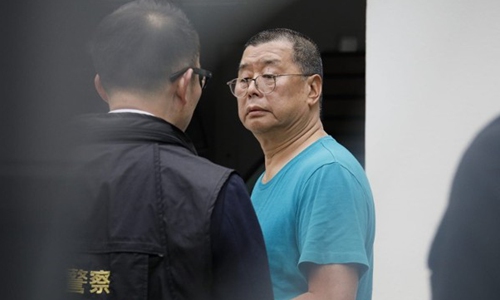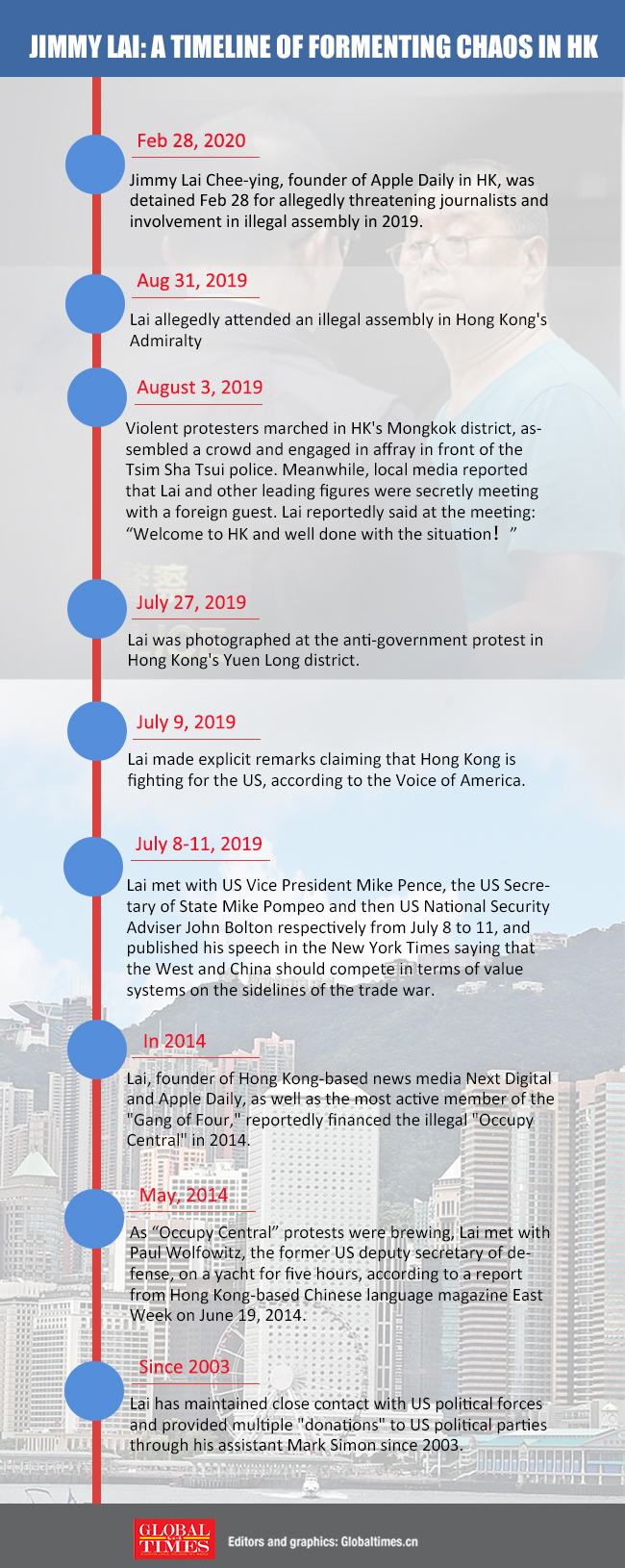HOME >> CHINA,SPECIAL-COVERAGE
Arrest of Jimmy Lai signals HK govt's enhanced enforcement after months-long riots
By GT staff reporters Source:Global Times Published: 2020/2/28 11:01:35 Last Updated: 2020/2/29 0:57:34

Photo via on.cc
The Hong Kong Police Force detained several Hong Kong riot leaders including Apple Daily founder Jimy Lai Chee-ying and pan-democratic figures Lee Cheuk-yan and Yeung Sum on Friday for taking part in an illegal assembly and criminal intimidation.
Observers and analysts considered the arrests as a symbolic move showing illegal political activities would eventually face legal proceedings, and the arrests also put a major test on the city’s judiciary system.
Lai, who owns the anti-government tabloid Apple Daily, was arrested on Friday morning at roughly 7:30 am after several officers from the crime unit came to his residence in Ho Man Tin, local media reports said. Ex-legislators Lee and Yeung were also detained by police at their homes, and police said that the arrests were made due to unlawful assembly on August 31, 2019, and a related criminal intimidation case.
The three were released on bail at noon, the police confirmed with the Global TImes. And local media reports said they will appear in court on May 5.
When Lai attended a rally at Victoria Park in June 2017, he suddenly approached a Hong Kong Oriental Daily reporter who was interviewed at the scene and used insults and intimidation. After the incident, Lai recorded a statement at the Hong Kong Island Regional Crime Squad in August 2018 at the request of the police but the Justice Department did not file the case.
“These arrests show that their political activities are illegal and will eventually face legal trials. There is no justification for violating the law,” Lawrence Tang Fei, a member of the Chinese Association of Hong Kong and Macao Studies, told the Global Times on Friday.
The police took action half a year ago after the illegal assembly, also suggesting the police obtained sufficient evidence and the chance of conviction is very high, Tang noted. “However, uncertainties remain, as in the past lenient sentences were given for unlawful assembly,” he said.
During the months of protests that turned into riots, which heavily weighed on Hong Kong’s social stability, anti-government figures were seen as typical examples of modern traitors, as these so-called “democratic” leaders have had unprecedented levels of contact with the US government and Western parliaments, forming increasingly brazen collusion tactics that have fueled the expansion of street politics in Hong Kong, observers said.
Apple Daily is known for its active stance in supporting violent Hong Kong protesters and it is seen as an accomplice to the rioters. The newspaper covered the months-long anti-government protests in a biased manner by focusing on law enforcement by police and depicting it as "police brutality" while ignoring the fact that protesters constantly provoked police first.
“Justice may be delayed but never absent," a local Hong Kong resident said in a group chat after reports about their arrests were released.
Li Xiaobing, an expert on Hong Kong, Macao and Taiwan studies at Nankai University in Tianjin, told the Global Times on Friday that the arrest of Lai is just the starting point.
“Given the social influence of Lai and his deep-rooted influence in Hong Kong, in addition to his collusion with foreign governments, any charges against him may exert a huge social impact. A legal battle and a war of opinion may ensue,” said Li.
It is an open secret in Hong Kong that the forces protesting the extradition bill have been sponsored by the US. The activist Lai was exposed by WikiLeaks to be closely related to US intelligence personnel, according to media reports. During protests against the now-withdrawn extradition bill, Lai had high-level meetings with senior US officials including US Vice President Mike Pence, Secretary of State Mike Pompeo and National Security Adviser John Bolton. The media mogul also attended major illegal assemblies and fueled street violence, speaking to foreign media in order to smear Hong Kong Special Administrative Region’s government and the central government.
To convict those arrested, the prosecutor must present sufficient evidence and the string of evidence must be clear so that the judge can make a fair judgment and hold those accountable, Li noted.
Li also warned that some external forces may make noise over Lai’s arrest, such as imposing pressure on the HKSAR government and the central government, and questioning the autonomy of the special administrative region.
In late August, the police also detained a number of anti-government lawmakers and activists, including notorious Joshua Wong and Agnes Chow who led the illegal Occupy Central movement in 2014. The pair were charged with unlawful assembly but were later released on bail, triggering doubts over legal judgments in Hong Kong.
Hong Kong laws stipulate that criminal intimidation can be dealt with through summary or indictment procedures, and the department of justice will allocate cases to different courts based on the severity of the crime, Kennedy Wong Ying-ho, solicitor at the Supreme Court of Hong Kong, told the Global Times on Friday.
If the case goes through summary procedures, the suspect will face penalties or imprisonment for less than two years. If the case goes through the indictment process, district courts or the high court can give sentences up to five years’ imprisonment.
The highest sentence of criminal charges regarding unlawful assembly by district courts is three years' imprisonment, and if handed down by the high court the sentence would be five years’ imprisonment, according to the veteran lawyer. “Taking part in an unlawful assemblies may lead to conviction, but the judge may not put Lai behind bars. Criminal intimidation is difficult to convict, but suspects will face imprisonment once convicted,” he said.
Tian Feilong, an associate professor at Beihang University in Beijing and a member of the Beijing-based Chinese Association of Hong Kong and Macao Studies, told the Global Times on Friday that the arrest and prosecution of Lai will help the SAR government exercise its autonomous right to end the chaos and resume the rule of law and order so that society can engage in rational dialogue and return to stability.
Tian believes that the prosecution of Lai is a test to Hong Kong’s judiciary system. “Hong Kong’s jurisdiction should adjust its partial judgment that favored anti-government protesters and give consideration to public order in the wake of a crisis regarding Hong Kong’s rule of law,” he added.
The legal action against Lai is a strong signal that the SAR government will not allow individuals like him to jeopardize Hong Kong’s rule of law and democratic order, Tian noted, adding that the government is responsible for maintaining the rule of law given the upcoming key elections.

Photo: Globaltimes.cn
Posted in: SOCIETY,FOCUS NEWS